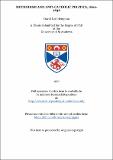Methodism and anti-Catholic politics, 1800-1846
Abstract
The growth of popular protestantism and the increased demands of Irish Catholicism were two nineteenth century developments which would not take place without conflict. The high Churchmanship and Toryism of Wesley coupled with Methodist experiences in Ireland ensured that Wesleyans would not support concessions to the Irish Catholics. The remarkable numerical growth of Methodism in England only highlighted its apparent failure in Ireland when confronted by a surprisingly resilient Catholicism. Most religious and social conflicts have political ramifications and this one was no exception. Battle lines were dram over three important questions. Were Roman Catholics entitled to the same political, rights as everyone else? What were the relative responsibilities of Church and State in the provision of education? What was to be the fate of protestantism in Ireland when it was in such a hopeless minority? In all of these questions Methodism and Roman Catholicism found themselves on completely opposite sides. As with later non-conformists the Wesleyans could not accept that what was theologically and morally wrong could ever be politically right. In response the Irish Catholics could appeal to the government for change in a country where the religion of the majority was politically and socially in subjection to the religion of the minority. Methodism's allies were the Established Church and the Tory party, and both let them down. In the disappointment of political failure over the Maynooth Bill the Wesleyans reaffirmed their belief in religious methods by participating in the Evangelical Alliance. In spite of short term successes Methodism's political objectives were not achieved and participation in public affairs often produced connexional disharmony.
Type
Thesis, PhD Doctor of Philosophy
Collections
Items in the St Andrews Research Repository are protected by copyright, with all rights reserved, unless otherwise indicated.

